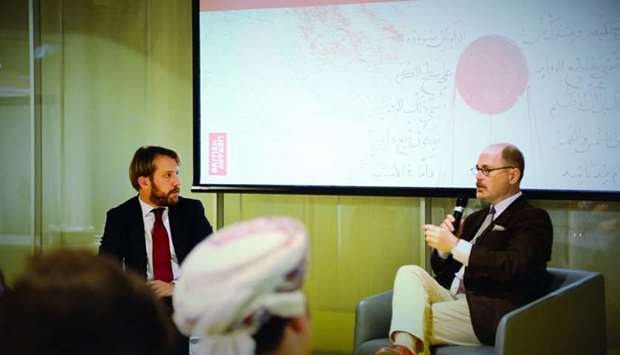Researchers, historians and the general public gained insights into the activities of Qatar Digital Library (www.qdl.qa) at a lecture that took place recently at Qatar National Library (QNL).
During the lecture, titled ‘A Digital Journey to the Past: Inside the Qatar Digital Library’, Dr James Onley, director of historical research and partnerships at QNL, discussed the Digital Library’s contributions to historical research on the Gulf.
“The Gulf region is the least written about part of the Middle East, while Qatar is the least written about part of the Gulf,” he said. “Part of the reason for this is that archival records on Qatar and the Gulf are dispersed around the world and difficult and costly to access. The Digital Library is now making Qatar and the Gulf the easiest part of the Middle East to research. This will encourage more historians to write on the region, shedding new light on its past.”
As part of QNL's ongoing partnership with the British Library, an additional 900,000 pages of historical material on the Gulf from the British Library’s collections, as well as medieval Arabic manuscripts on science, will be uploaded to the Digital Library over the coming three years.
“Much of the material on the Gulf has not seen the light of day since its creation over a century ago because it is uncatalogued and therefore difficult to access. Other material, though accessible has been little used, such as the East India Company’s ship’s logs from the early-17th to mid-19th centuries, which chronicle the incorporation of the Gulf into the global economy,” he added.
Richard Davies, head of the British Library-Qatar Foundation Partnership at the British Library, said: “The next phase of the partnership will bring to life a significant and previously unseen amount of archival material from the British Library, which will have a tangible impact on how research is done on the Gulf region.”
The Digital Library is the world’s largest open access digital repository on Middle Eastern history. It currently offers free access to over 1.6mn pages of historical documents on the Gulf, as well as medieval Arabic manuscripts on science, which are regularly cited by researchers, academics and social scientists.
During the lecture, titled ‘A Digital Journey to the Past: Inside the Qatar Digital Library’, Dr James Onley, director of historical research and partnerships at QNL, discussed the Digital Library’s contributions to historical research on the Gulf.
“The Gulf region is the least written about part of the Middle East, while Qatar is the least written about part of the Gulf,” he said. “Part of the reason for this is that archival records on Qatar and the Gulf are dispersed around the world and difficult and costly to access. The Digital Library is now making Qatar and the Gulf the easiest part of the Middle East to research. This will encourage more historians to write on the region, shedding new light on its past.”
As part of QNL's ongoing partnership with the British Library, an additional 900,000 pages of historical material on the Gulf from the British Library’s collections, as well as medieval Arabic manuscripts on science, will be uploaded to the Digital Library over the coming three years.
“Much of the material on the Gulf has not seen the light of day since its creation over a century ago because it is uncatalogued and therefore difficult to access. Other material, though accessible has been little used, such as the East India Company’s ship’s logs from the early-17th to mid-19th centuries, which chronicle the incorporation of the Gulf into the global economy,” he added.
Richard Davies, head of the British Library-Qatar Foundation Partnership at the British Library, said: “The next phase of the partnership will bring to life a significant and previously unseen amount of archival material from the British Library, which will have a tangible impact on how research is done on the Gulf region.”
The Digital Library is the world’s largest open access digital repository on Middle Eastern history. It currently offers free access to over 1.6mn pages of historical documents on the Gulf, as well as medieval Arabic manuscripts on science, which are regularly cited by researchers, academics and social scientists.

